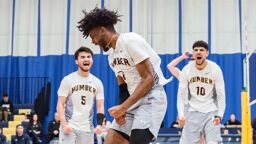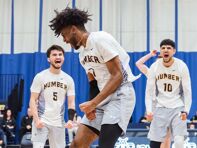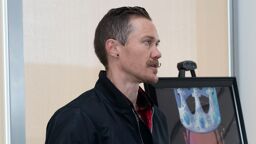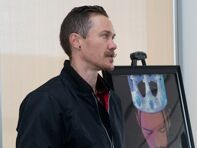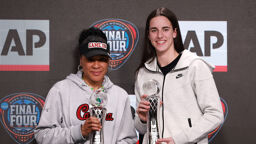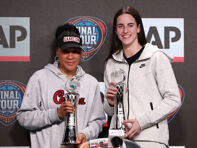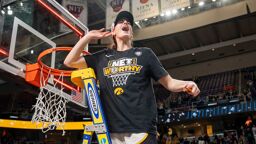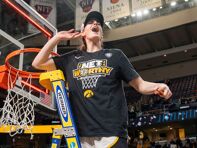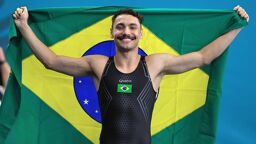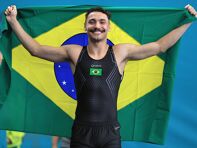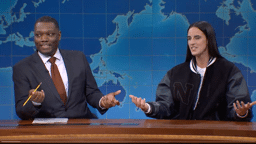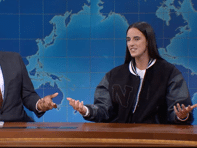The recent Out In Sports study revealed widespread acceptance of LGBTQ athletes who come out to teammates in high school and college. You can find more here.
Athletes slow or all together stop using homophobic slurs and anti-LGBTQ language when a teammate comes out.
That’s one of the many revealing results of the Out In Sports study, conducted by Outsports, the Univ. of Winchester and the Sports Equality Foundation, looking at the experiences of LGBTQ athletes who have come out to their teams.
Most of these LGBTQ athletes came out to their teammates despite hearing that problematic language used on the team. Before coming out, 69.3% of LGBTQ athletes say they heard at least one out of 10 teammates use homophobic language on a weekly basis.
When asked about hearing this language after they came out, that number drops to less than half — 49.5%.
“While it would be better if they did not use this language in the first place, when most athletes use language we might consider to be homophobic, they don’t mean to convey dislike of LGBTQ people,” said professor Eric Anderson, the lead researcher on the study. A former high school coach himself, Anderson has been researching homophobia in sports for two decades. “That is why, when they learn someone LGBTQ can hear them, they usually stop doing it.”
In addition, the use of this language was mainly by a minority of teammates. Even before coming out, only 13.8% of the respondents said they heard that language from half or more teammates, and that number drops to 5.1% after they came out.
All told, of the athletes who had heard teammates use anti-LGBTQ language before they came out, 56.6% indicated a reduction in the number of teammates who used that language after they came out.
Vast majority of athletes ‘never’ the target of homophobic language after coming out
Most of the athletes surveyed said they “never” heard anti-LGBTQ language directed at them.
When asked if teammates ever directed anti-LGBTQ language or slurs at them after coming out, 78% said “never,” with another 14% being unsure or saying “rarely.” This reflects the widespread overall acceptance LGBTQ athletes in the study said they experienced, with over 95% saying their experience with teammates was “neutral” at worst.
“I don’t think teammates generally target each other in an attempt to hurt each other.” -Anthony Nicodemo
“It’s been humanized for them,” Brock McGillis said of the change in behavior when athletes have an out teammate. McGillis is a former hockey player who now advocates for building more-inclusive spaces in sports. “When we put a face to something and it’s someone we know, there’s impact.”
Anthony Nicodemo, an out gay high school basketball coach and athletic director, as well as a Sports Equality Foundation board member, said athletes want to support teammates as they all have the same goal of winning together.
“I don’t think teammates generally target each other in an attempt to hurt each other,” Nicodemo said. “So naturally, when someone comes out on a team, they’re going to be more conscious than they were previous to having someone who’s LGBTQ in the locker room.”
Plenty of work still to be done on anti-LGBTQ language in sports
Still, that 69.3% number — the athletes who heard teammates use anti-LGBTQ language before they came out — sticks out.
That language is part of the dynamic in sports that make LGBTQ people think they will not be welcome if they come out. About two-thirds of the athletes in the Out In Sports study said the response from their teammates was “better” or “much better” than expected, while only about 3% said it was worse.
That shows not just widespread acceptance, but also lower expectations.
In part because of this language, LGBTQ athletes believe their teammates will reject them, even as they’re coming out.
“It’s the easiest thing we can shift, the words we use.” -Brock McGillis
“I felt like every gay slur or anti-LGBTQ+ language was directed at me,” said former Univ. of Miami football player TJ Callan. “I know they weren’t necessarily aimed at me but they felt extremely personal while I was there.”
Nicodemo said this kind of language keeps many athletes from coming out to teammates.
“If that language is being used in the locker room before the team knows they have someone gay on their team, that’s going to slow someone’s coming out process,” Nicodemo said. “Especially when you’re dealing with younger kids, high school kids.”
It’s one of the tentpoles of the work of people like McGillis and the Sports Equality Foundation, to curb the use of language that often falsely tells LGBTQ people they don’t belong.
“Language is what impacted me the most, even if it wasn’t directed at me,” McGillis said. He said he visits 50 to 75 schools annually to talk about his experiences. “It impacted me as if it was. It’s the easiest thing we can shift, the words we use. There are larger shifts that need to happen, but the language we use, we can correct tomorrow.”
You can find Brock McGillis and Anthony Nicodemo on Twitter.







